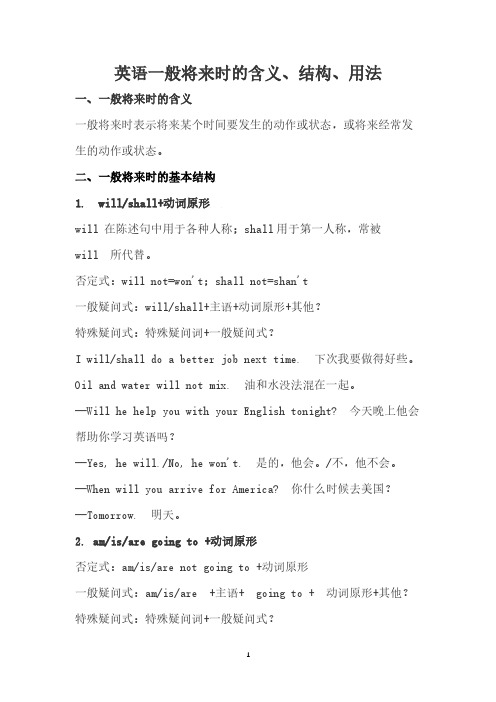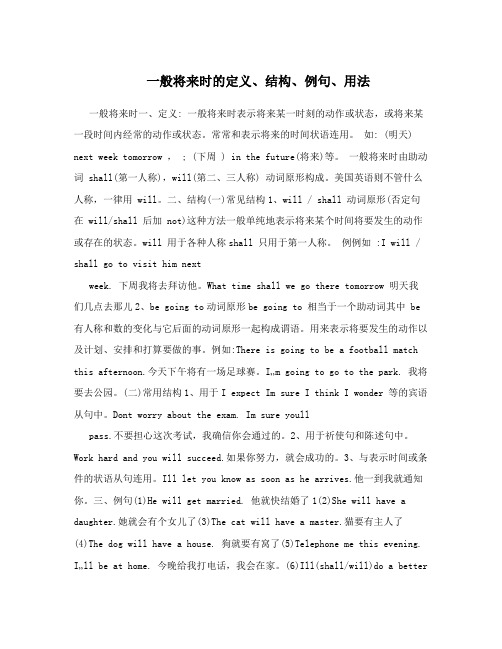英语一般将来时
初中英语语法一般将来时

初中英语语法一般将来时【初中语法系列】一般将来时,结构是重点!一般将来时是初二英语要研究的内容,在初中整个语法系统中占非常重要的内容,也是历次考试的高频考点.1一般将来时的含义一般将来时表示将来某个时间要发生的动作或状态,或将来经常发生的动作或状态。
2一般将来时的基本结构1. will/shall+动词原形will在陈述句中用于各种人称;shall用于第一人称,常被will所代替。
否定式:will not=won'tshall not=shan't一般疑问式:will/shall+主语+动词原形+其他?特殊疑问式:特殊疑问词+一般疑问式?I will/shall do a better job next time.下次我要做得好些。
Oil and water will not mix.油和水没法混在一起。
—Will he help you with your English tonight?今天晚上他会帮助你研究英语吗?—Yes, he will./No, he won't.是的,他会。
/不,他不会。
—When will you arrive for America?你什么时候去美国?—Tomorrow.来日诰日。
2. am/is/are going to +动词原形否认式:am/is/are not going to +动词真相普通疑问式:am/is/are +主语+ going to +动词真相+其他?特殊疑问式:特殊疑问词+普通疑问式?He is going to spend his holidays in London.他打算在伦敦度假。
Look at the dark clouds. There is going to be a storm.看那乌云,快要下雨了。
Is he going to collect any data for us?他会帮我们搜集数据吗?What are you going to do tomorrow?明天你打算作什么?3will+动词原形与am/is/are going to +动词原形的用法区别will+动词原形与am/is/are going to +动词原形的用法虽然都表示将来发生动作或情况,一般情况下能互换。
英语语法一般将来时的含义、结构、用法

英语一般将来时的含义、结构、用法一、一般将来时的含义一般将来时表示将来某个时间要发生的动作或状态,或将来经常发生的动作或状态。
二、一般将来时的基本结构1. will/shall+动词原形will 在陈述句中用于各种人称;shall用于第一人称,常被will 所代替。
否定式:will not=won't;shall not=shan't一般疑问式:will/shall+主语+动词原形+其他?特殊疑问式:特殊疑问词+一般疑问式?I will/shall do a better job next time. 下次我要做得好些。
Oil and water will not mix. 油和水没法混在一起。
—Will he help you with your English tonight? 今天晚上他会帮助你学习英语吗?—Yes, he will./No, he won't. 是的,他会。
/不,他不会。
—When will you arrive for America? 你什么时候去美国?—Tomorrow. 明天。
2. am/is/are going to +动词原形否定式:am/is/are not going to +动词原形一般疑问式:am/is/are +主语+ going to + 动词原形+其他?特殊疑问式:特殊疑问词+一般疑问式?He is going to spend his holidays in London. 他打算在伦敦度假。
Look at the dark clouds. There is going to be a storm. 看那乌云,快要下雨了。
Is he going to collect any data for us? 他会帮我们收集数据吗?What are you going to do tomorrow? 明天你打算作什么?三、一般将来时的用法will+动词原形与am/is/are going to +动词原形的用法虽然都表示将来发生动作或情况,一般情况下能互换。
初中英语语法一般将来时

一般将来时一.一般将来时的定义:表示将来某一个时间将要发生的动作或存在的状态,表示将来经常或重复发生的动作。
二.一般将来时的标志:tomorrow(明天),the day after tomorrow(后天)next year(明年)next month(T—个月)next week(下一个星期)3.一般将来时的构成:1.主语^be(am,is,are)going to+动词原形+..例如:(1).I am going to play football tomorrow.明天我将要踢足球.(2).She is going to watch a movie the day after tomorrow.后天她要看一场电影.2.主语+will/shall+动词原形+.....说明:(l).will/shall有时可以和be going to互换;(2) .will是万能的,shall只能用在第一人称,主语是I,we.(3) .will和shall的后而接动词原形)例如shall/will go to Beijing next month.。
will=I11)下个月我将要去北京.(2) .You will come to see me tomorrow.(you will=you'll)明天你将要来看我.(3) .She will read English tomorrow moming.(She will=She'll)明天早上她将要读英语.四.句一般将来时的式:1.肯定句:(1) ..主语+be(am,is,are)going to+动词原形+......(2) ..主语+will/shall+动词原形+.....例句和上面一样,就不举了.2.否定句:(1)..主语+be(am,is,are)not going to+动词原形+......例如:(A):I am not going to play basketball tomorrow.明天我不将踢足球.(B).She is not/isn't going to visit Shanghai next year.明年她不将参观上海.(2)..主语+will/shall not+动词原形+.....(A).I shall not go to school the day after tomorrow o后天我不将上学了(B).I will not write my homework this evening.(will notl=I won't)今晚我不将写作业(C).She will not see a movie next week.(will not=won't)下个星期她将不看一场电影.3.一般疑问句:(A).Am/Is,Are+主语+going to+动词原形+....例如(A).—Am I going to see my grandfather tomorrow?明天我将去看我的爷爷吗?—Yes,you are.是的,你将去.(B).— Are you going to listening to the tape tomorrow?明天你将听录音带吗?—No,I am not.不,我不将.(C). —Is she going to Beijing next year? 明年我将去北京吗?-Yes,she is.是的,她将.(2).Will//shall+主语+动词原形+…例如(A). —Shall we play volleyball next class?下一节课我们将打排球吗?-Yes,you will,是的,你们将.(B). —Will you come here next week?下个星期你将来这儿吗?-Yes,I will.是的,我将.(C).--Will she teach us this term?这学期,她将教我们吗?—Yes,she will.是的,她将.4.特殊疑问句:(1).What(Where,How...)+be(am,is,are)+主语+going to+动词原形+...?例如:(A).—What are you going to do tomorrow? 明天你将要做什么?—rm going to the park? 我将要去动物园.(B).--Where are you going to swim? 你将要去哪儿游泳?—I'm going to swim in the river.(2). What(When,Where,How...)+主语+动词原形+...?例如:(A).---What will you do next week?下个星期你将要做什么?--1 will do my homeworko 我将要做作业.(B).—How will she come here tomorrow?明天她将要怎么来这儿?—She will come here by bus 。
小学英语一般将来时

be going to句型的特殊疑问句形式。
疑问词 + be动词 +主语 + going (to) +(动作)+(时间副词)?
常用的疑问词有:
what where when which who how
什么(提问事情) 在哪里 (提问地点) 在什么时候 (提问时间) 选择哪一个(提问人或物) 谁 (提问人) 怎么样 (提问方式)
( B ) 9. We ________ the work this way next time. A. do B. will do C. going to do D. will doing
What is Hui Tailang going to do?
He is going to ski.
What is Lan Yangyang going to do?
He is going to sweep the floor.
What is Xi Yangyang going to do?
一般将来时be going to句式的构成: 主语 + be going to +动词原形/地方 +(将来时间)
visit 1. We are going to grandparents tomorrow. 2. Sheisgoing to go soon. read 3. He is going to books this evening. 4. My parents is are going to Beijing next week. is改为 5. John is go to the park.
①通常用will + V说或写都尽量使用“I’ll, You’ll, He‘ll , She’ll , It’ll, We’ll , They’ll …”的简缩形式 否定形式 :will not = won’t I won‘t see him again.
初中英语 一般将来时课件(PPT18张)

Ⅳ.一般将来时的被动语态
一般将来时的被动语态表示“…将要被…”,其常用的表达形式有以下几种:
一般将来时被动语态:
will/shall + be /get done (表示意想不到的要发生的事情)
be going to be + done (表示按计划或安排发生的被动动作) be about to be + done (指将要发生的事情)
2.They ________ an English evening next Sunday. A. are having B. are going to have C. will having D. is going to have
3.—Tell him about the news when he _______, John.
考点2:考察一般将来时的不同表达方式
1.– Will his parents go to see the Terra Cotta Warriors tomorrow? – No, ________ (不去).
A. they willn’t. B. they won’t. C. they aren’t. D. they don’t.
基本结构:
1.主语+will/shall+do sth 2.主语+am/is/are+going to+do sth
3. 主表语示+位am移/is的/ar动e+词do可ing用s现th 在进行时表将来 4. 主特语定+时do间sth和条件状语从句可用一般将来时表将来
5.主语+am/is/are+(about)+to+do sth 注:之所以不用be是因为这是一般将来时,而be还包括过去式的 was、were
英语时态:一般将来时

英语时态:一般将来时一般将来时(simple future tense)表示将来某一时段的动作或状态,或将来某一段时间内经常的动作或状态。
一般将来时常常和表示将来的时间状语连用。
如:tomorrow, next week, in the future, in a year等。
Ⅰ. 句法结构【仅讨论陈述句和疑问句两种语式】:1.陈述句:A. 肯定形式:主语+be going to /will/shall +动词原形+其他B. 否定形式:主语+be not going to /will not/shall not+动词原形+其他注:a. 在直接在助动词后加not。
b. be going to结构中的be仅指am, is, are三个be动词。
c. will/shall+动原结构在谓语两态变化中无人称和数的变化。
d. 一般情况下,仅表示时态时,shall用于第一人称,will用于第二、三人称;表示说话人强烈意愿和语气时则用法相反。
2.疑问句:A. 一般疑问句:助动词提前即可①Be动词+主语+ going to +动词原形+其他②Will/Shall+主语+动词原形+其他B.特殊疑问句:特殊疑问词+一般疑问句(同上)3.被动语态:主语+ 助动词(结构) + be +动词过去分词【被动结构be done,时体现在助动词】➢两态变化例句参考下表(以will为例):Ⅰ. 主要用法及结构:1.【一般将来时表将来】一般将来时表示将要发生的动作或情况。
A.will/shall +动原I will(shall) arrive tomorrow.Will you be free tonight?B.be going to+动原a.表示计划、打算、准备做的事。
We are going to put up a building here.b.表示即将发生或肯定要发生的事。
I think it is going to snow.注:在一般将来时的句子中,有时有表示将来时间的状语,有时没有时间状语,这时要从意思上判断是否指未来的动作或情况。
英语一般将来时讲解

一般将来时一、一般将来时定义:一般将来时表示将来某一时刻,或将来某一段时间内的动作或状态。
二、一般将来时两个招牌单词will/shall,shall用于第一人称单数,如:shall I…,I shallshall we 。
we shall will则通用三、基本结构will/shall + V原四、缩略形式will 常简略为'll,并与主语连写在一起,如:I'll,he'll,it'll,we'll,you'll,they'll。
例句:Will you be free tonight? 你今晚有空吗?We won’t(shan’t) be busy this evening. 我们今晚不忙。
He’ll go to London next weekWe’ll only stay for two weeks. 我们只待两星期。
We’ll go to the Great Wall if it is fine tomorrow.We shall have a delicious dinner tonight. 今晚我们将美餐一顿。
Shall we go to the park ,tonight ??Tomorrow will be Sunday. 明天就是星期天。
The rain will stop soon. 雨很快就要停了。
Shall we go there at five? 我们五点钟去那儿,好吗?Will you please open the door? 请你把门打开,好吗?五、用法基本用法:“助动词will或shall+动词原形”这一形式,表示将来发生的事情,用于征求对方的意见或表示客气的邀请。
在口语中will用于所有人称,书面语中第一人称常用shall。
如:I can see you're busy, so I won't stay long.我看得出你很忙,所以我不会呆太久。
一般将来时的定义、结构、例句、用法

一般将来时的定义、结构、例句、用法一般将来时一、定义: 一般将来时表示将来某一时刻的动作或状态,或将来某一段时间内经常的动作或状态。
常常和表示将来的时间状语连用。
如: (明天) next week tomorrow , ; (下周 ) in the future(将来)等。
一般将来时由助动词 shall(第一人称),will(第二、三人称) 动词原形构成。
美国英语则不管什么人称,一律用 will。
二、结构(一)常见结构1、will / shall 动词原形(否定句在 will/shall 后加 not)这种方法一般单纯地表示将来某个时间将要发生的动作或存在的状态。
will 用于各种人称shall 只用于第一人称。
例例如 :I will / shall go to visit him nextweek. 下周我将去拜访他。
What time shall we go there tomorrow 明天我们几点去那儿2、be going to动词原形be going to 相当于一个助动词其中 be 有人称和数的变化与它后面的动词原形一起构成谓语。
用来表示将要发生的动作以及计划、安排和打算要做的事。
例如:There is going to be a football match this afternoon.今天下午将有一场足球赛。
I…m going to go to the park. 我将要去公园。
(二)常用结构1、用于I expect Im sure I think I wonder 等的宾语从句中。
Dont worry about the exam. Im sure youllpass.不要担心这次考试,我确信你会通过的。
2、用于祈使句和陈述句中。
Work hard and you will succeed.如果你努力,就会成功的。
3、与表示时间或条件的状语从句连用。
Ill let you know as soon as he arrives.他一到我就通知你。
- 1、下载文档前请自行甄别文档内容的完整性,平台不提供额外的编辑、内容补充、找答案等附加服务。
- 2、"仅部分预览"的文档,不可在线预览部分如存在完整性等问题,可反馈申请退款(可完整预览的文档不适用该条件!)。
- 3、如文档侵犯您的权益,请联系客服反馈,我们会尽快为您处理(人工客服工作时间:9:00-18:30)。
6.What______you______(do)nextSunday?I_______(milk)cows.
7.Mary____________(visit)hergrandparentstomorrow.
8.I________________(water)theflowersnow.
21.10.??Myfatherandmotheraregoingtoseeaplaythedayaftertomorrow.(同上)
22.__________________goingtoseeaplaythedayaftertomorrow
11.LiMingisgoingtoseetheanimalsthere.(特殊疑问句)
五、对划线部分提问பைடு நூலகம்一般情况,一般将来时的对划线部分有三种情况。
1.?问人。Who例如:I’mgoingtoNewYorksoon.→Who’sgoingtoNewYorksoon?
2.?问干什么。What…do.例如:MyfatherisgoingtowatchTVwithmethis???afternoon.→Whatisyourfathergoingtodowithyouthisafternoon.
Buttodayisrainy.He______________(go)toschoolbybike.
4.Whatdoyouusuallydoonweekends?
--Iusually________(watch)TVand_________(catch)insects?
5.It'sFridaytoday.What_____she_________(do)thisweekend?
A.danceB.isdancingC.willdance
()7.Myfriends___________inthepoolthisafternoon.
A.aregoingtoswimB.willswimsC.areswimming
()8.Whatareyougoingtodointheevening?
18._______________meetatthebusstopat10:30.
19.9.??Sheisgoingtolistentomusicafterschool.(对划线部分提问)
20._______________she_________________________afterschool?
A.readingB.readC.willread
()11.Whatwouldyouliketohavefordinner?
A.I’dlikesomebread.B.Iwouldliketohaveadrink.C.Iwillliketohavedinner.
()12.Whenareyougoingtothelibrary?
.三、用所给词的适当形式填空。
1.Todayisasunnyday.We___________(have)apicnicthisafternoon.
2.Mybrother_______________(go)toShanghainextweek.
3.Tomoften______________(go)toschoolonfoot.
A.I’mdoingmyhomework.B.Iwilldomyhomework.C.Theydohousework.
()9.TomandJimmy___________togethertonight.
A.aregoingtoplayB.isgoingtoplayC.amgoingtoplay
()10.Thestudentsusually___________booksinthemorning.
英语一般将来时
一、概念:
表示将要发生的动作或存在的状态及打算、计划或准备做某事。句中一般有以下时间状语:tomorrow,nextday(week,month,year…),soon,thedayaftertomorrow(后天)等。
二、基本结构:①begoingto+do;
②will+do.
三、否定句:在be动词(am,is,are)后加not或情态动词will后加not成won’t。
例如:I’mgoingtohaveapicnictomorrow.→I’mnotgoingtohaveapicnictomorrow.
四、一般疑问句:be或will提到句首,some改为any,and改为or,第一二人称互换。
例如:Wearegoingtohaveapartythisweekend.→Areyougoingtohaveapartythisweekend?
四.选择正确的选项。
()1.I___thehouseworktomorrow.
A.doB.amdoingC.amgoingtodo
()2.Heoften___________toschoolwithhisfriend.
A.goB.goesC.going
()3.Willyou___noodlesforbreakfasttomorrowmorning?-No,Iwon’t.
14.I_______go______jointhem.
15.7.??I’mgoingtogetupat6:30tomorrow.(改一般疑问句)
16._______________________togetupat6:30tomorrow?
17.8.??Wewillmeetatthebusstopat10:30.(改一般疑问句)
3.问什么时候。When.例如:She’sgoingtogotobedatnine.→Whenisshegoing?tobed?
六、同义句:begoingto=will
Iamgoingtogoswimmingtomorrow(明天).=Iwillgoswimmingtomorrow.
练习
一、填空:
1.?我打算明天和朋友去野炊。
________________________________________________________
12.Theyaregoinghikingtomorrowmorning.(一般疑问)
________________________________________________________
4.What_________youdonextMonday?I________playbasketball.
5.3.??你妈妈这个周末去购物吗?是,她要去买一些水果。
6._____yourmother_______________goshoppingthis___________?
7.Yes,she_________.She________________________buysomefruit.
A.haveB.hasC.having
()4.Isshegoingtowork?Yes,_____.A.shewill.B.sheis.C.shedoes.
()5.TomorrowisSunday,we___________apicnic.
A.haveB.ishavingC.willhave
()6.Look,thegirl___________.
I___________________haveapicnicwithmyfriendstomorrow.
I________haveapicnicwithmyfriendstomorrow.
2.下个星期一你打算去干嘛?我想去打篮球。
3.What___________________________________________nextMonday?I__________________playbasketball.
A.Tomorrowmorning.B.Today.C.Yesterday.
()13.Areyougoingtoschooltomorrow?
A.No,Iwasn’t.B.No,I’mnot.C.Yes,wearen’t.
8.4.?你们打算什么时候见面。
9.Whattime_______you___________________meet?
10.二、改句子:
11.5.?Nancyisgoingtogocamping.(改否定)
12.Nancy________goingtogocamping.
13.6.??I’llgoandjointhem.(改否定)
